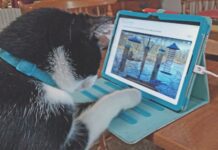Last months column discussed how to identify the condition commonly known as separation-related anxiety. Briefly, separation-related anxiety may be diagnosed when the behavior in question (1) appears to reflect anxiety, (2) is exhibited primarily when the cat does not have access to family members and (3) is exhibited during the majority of these separations. This column will discuss some of the treatment options for cats that suffer from separation-related anxiety.
The first suggestion is easier said than done: Avoid making hellos and goodbyes into major productions. Although you have surely missed your cat as much as he missed you, try to remain quiet and low-key. You need to convince him that departures and arrivals are not really big events after all. Perhaps sit quietly for a few minutes before you leave the house so that your cat can unwind with you. When you return, a brief how was your day is fine, but there should be no play or food or cuddle time until it is clear that your cat has relaxed. Waiting about 20 minutes is generally safe.
How Do You Act?
Next, consider your behavior when you are home with your cat. If your cat is very demanding of your attention, try making him wait a while before responding to him. You may even teach him to sit before paying attention to him. He needs to be patient and accept attention when you are able to offer it to him. Imagine the distress of a cat that expects his person to respond at once to his every demand, yet suddenly finds that no one is available to answer his call. Try to initiate interactions when he appears calm and relaxed rather than insistent.
Another useful treatment technique is to desensitize your cat to being alone. You may even be able to practice this without leaving the house. For instance, if your cat always accompanies you to every room, try closing the door sometimes. Vary the time that you are in the closed room. Sometimes, do it for just a few minutes, other times an entire hour. Treat the confinement as a departure: no fussing when you return.
Many cats pay a lot of attention to our predeparture routine. Compile a list of things that you do as you prepare to leave the house. Then, when you do not plan to go anywhere for the morning, do some of those things. For instance, pack your lunch but eat it at home. Or pretend to fix your hair a few times during the course of a day off. You are unlikely to completely fool your cat, but if you can just lower his reactivity a little bit, you will be on the way to recovery.
It seems intuitive that while a cat is enjoying himself, he is not experiencing anxiety.
Consider your cats pleasures. If your cat is particularly playful, try leaving an assortment of toys each day. Vary the toys as well as the locations so that he needs to explore, taking his mind off your absence. This is particularly important when treating cats that ingest or chew inappropriate items when left alone.
Another source of entertainment is the television. Many cats appear to focus on the television. In fact, videotapes designed to appeal to cats are commercially available.
Food as Distracting Comfort
For cats that love food, try hiding treats or snacks in various locations. Food-filled balls are available and appear to amuse many cats. By batting the ball, the cat earns kibble and, at the same time, has an opportunity to play.
A special treatment note is warranted for one of the most common manifestations of separation-related anxiety in cats: elimination on socially significant items. Placing an extra litter box in a strategic location may resolve this problem. Surfaces such as beds and furniture may need to be protected with vinyl-backed pads.
In addition to environmental and behavioral modification, pharmacological intervention may be indicated for some cats. After confirming a diagnosis of separation-related anxiety, your veterinarian or a veterinary behaviorist can determine which drugs would be safest and most effective for your cat. Although it is not a drug, the pheromone product called Feliway appears to reduce certain signs of anxiety in many cats. This product is available as a spray and a diffuser. (See page 2 for related story.)
One final note: Please do not scold your cat when you return to evidence of damage or elimination. Your cat is not being spiteful nor is he punishing you. He was merely communicating his distress. Punishment will only serve to increase any underlying anxiety, and may create a conflict should your cat develop a fear of your arrival.
Relief is definitely available. Both you and your cat should be able to relax when you are unable to be together.



